At CIUK 2022 there will be four parallel breakout sessions running alongside the main programme of presentations.
There are also two other meetings taking place in conjunction with CIUK. The Science and Technology Facilities Council (STFC) are organising a workshop on Thursday 24 November at STFC Daresbury Laboratory called "STFC in Conversation: Net Zero". The Lustre UK User Group will be hosting a meeting at Manchester Central the day before CIUK 2022. Both are free to attend but require a seperate registration. Follow the links below for details.
Details of the sessions can be found below...
Wednesday 30 November
| Lustre UK User Group 2022
| 14:00 - 17:00
|
|---|
Thursday 1 December
| CoSeC Annual Conference 2022
| 10:00 - 16:00
|
Friday 2 December
| Women in HPC Breakfast
| 08:30 - 10:30
|
Friday 2 December
| Spectrum Scale User Group
| 10:30 - 12:30
|
Friday 2 December
| ENERGETIC: A workshop regarding Energy Benchmarking on
Heterogeneous Systems
|
14:00 - 16:00 |
|---|
The STFC in Conversation: Net Zero Workshop and the Lustre UK User Group Meeting are NOT included in your CIUK registration. The meetings are free to attend but a separate registration is required. Follow the lnks below for details.
The CIUK breakout sessions are open to all CIUK 2022 registered delegates. You must be registered for CIUK 2022 in order to join one of these breakout sessions.
Thursday 24 November (09:30-16:00)
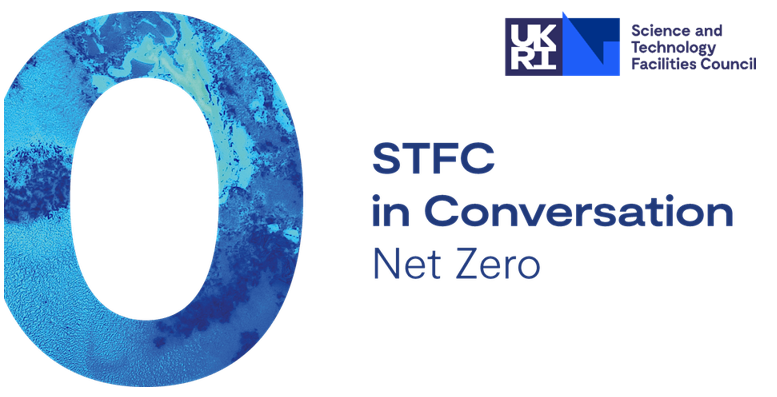 Hosted in conjunction with CIUK this meeting will be held at STFC Daresbury Laboratory, Warrington. You are invited to join STFC and the Community in a conversation around future Net Zero priorities.
Hosted in conjunction with CIUK this meeting will be held at STFC Daresbury Laboratory, Warrington. You are invited to join STFC and the Community in a conversation around future Net Zero priorities.
NOTE: this meeting requires a separate registration and is not covered by your CIUK registration. Please see the official invitation for details.  STFC in Conversation.pdf.
STFC in Conversation.pdf.
Wednesday 30 November (14:00-17:00)
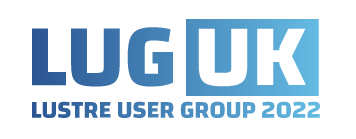
Hosted alongside CIUK in Manchester, this event brings together the UK Lustre Community, with keynote speakers from Lustre open source contributors, engineers and partners, sharing their experience and technology roadmap updates.
NOTE: this meeting requires a separate registration and is not covered by your CIUK registration. Please visit the LUGUK website to register.
Thursday 1 December (10:00-16:00)
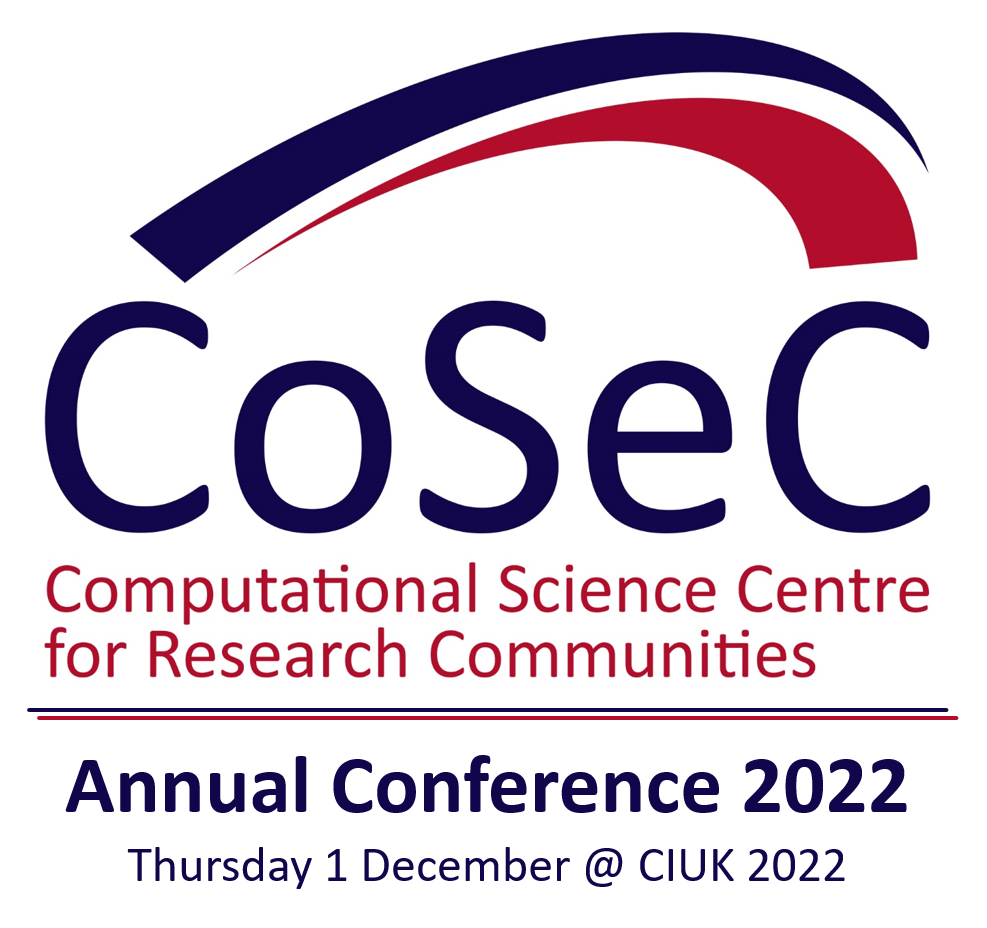 The Computational Science Centre for Research Communities (CoSeC) supports the advancement of scientific research by developing and strengthening software to analyse and solve increasingly complex problems in multiple disciplines - physics, chemistry, life sciences, engineering, and more.
The Computational Science Centre for Research Communities (CoSeC) supports the advancement of scientific research by developing and strengthening software to analyse and solve increasingly complex problems in multiple disciplines - physics, chemistry, life sciences, engineering, and more.
Funded by EPSRC, MRC, and BBSRC, CoSeC also provides a hub for exchanging knowledge and expertise through training and outreach. Long-term partnerships and collaborations with universities and other research establishments are at the heart of what CoSeC does. Together, they convey longevity to the software and expertise that, alongside continued advancement of computational hardware and the nurturing of strong collaborations, provide what is necessary for scientific communities to flourish.
Come along on Thursday 1 December to find out more about what CoSeC is, what it does and how it does it.
Friday 2 December (08:30-10:30)
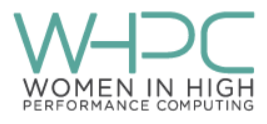 We are pleased to launch our first ever Women in HPC (WHPC) Networking Breakfast on Friday 2 December starting at 08:30.
We are pleased to launch our first ever Women in HPC (WHPC) Networking Breakfast on Friday 2 December starting at 08:30.
This breakfast is included in the conference registration and is open to all conference delegates. Tea, coffee and food will be available and there will be a selection of presentations.
By attending you will be able to:
- Learn more about how to be an ally for diversity, equity and inclusion in HPC.
- Engage in talks and conversation around the barriers and skills gaps which face those who wish to enter the field.
- Meet WHPC leaders from our UK and EMEA Chapters and Affiliates.
More information and a schedule can be found on the WHPC website. We look forward to seeing you there.
Friday 2 December (10:30-12:30)
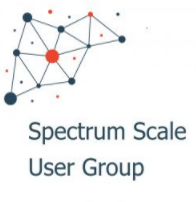
The Spectrum Scale (GPFS) user group is open to all using, interested in using or integrating Spectrum Scale. We have groups running across the world but our main focus is in the UK, USA and Australia. We welcome Spectrum Scale users from a wide range of industries and are not sector specific. Our current membership base includes representation from media, academia, finance, research, automotive, defence and pharmaceutical industries.
The Spectrum Scale User Group aims to:
- Bring together users of Spectrum Scale and Spectrum Scale with Spectrum Protect ILM (TSM HSM) into a collective environment
- Represent the needs of the Spectrum Scale User Group members
- Liaise with IBM and our User Group members to improve Spectrum Scale and Spectrum Scale with Spectrum Protect ILM
- Provide a “localised” community for support and knowledge sharing
- Raise awareness of Spectrum Scale as a capable data management platform
Friday 2 December (14:00-16:00)
ENERGETIC: A workshop regarding Energy Benchmarking on Heterogeneous Systems
 This session will be led by the “Energetic” sub-project - part of the UKRI "Net Zero Digital Research Infrastructure Project" - which is (i) exploring potential role of heterogenous architectures to reduce energy consumption of HPC codes and (ii) to initiate discussion on how to reliably and accurately monitor energy usage of HPC systems and how to share this information at a job level with all users.
This session will be led by the “Energetic” sub-project - part of the UKRI "Net Zero Digital Research Infrastructure Project" - which is (i) exploring potential role of heterogenous architectures to reduce energy consumption of HPC codes and (ii) to initiate discussion on how to reliably and accurately monitor energy usage of HPC systems and how to share this information at a job level with all users.
ENERGETIC: Energy Benchmarking on Heterogeneous Systems
The ENERGETIC sub-project (part of the UKRI Net Zero DRI Project) is investigating the potential role of heterogeneous architectures in reducing the energy consumption of digital research infrastructure. Our aim is to investigate which accelerators may give an energy advantage and in what circumstances, how can DRI users reliably and accurately benchmark energy usage of their own codes on heterogeneous systems, and how do we ensure that energy benchmarking results are fairly compared. Ultimately, we hope that UK DRI users will be empowered to benchmark their own applications using standardised tools and methodologies, and as a result will be able to choose most energy efficient way to do their science. In this session we will present some of our own findings from benchmarking applications on heterogeneous systems, and then initiate a series of discussion groups. In particular, we will discuss the following points:
- In what areas might we see energy advantage from accelerators?
- What barriers exist to user-level benchmarking of applications on UK DRI?
- How do we fairly compare application energy usage across architectures?
We invite DRI stakeholders at all levels: users, vendors, administrators, and policymakers to come and join the discussion.
